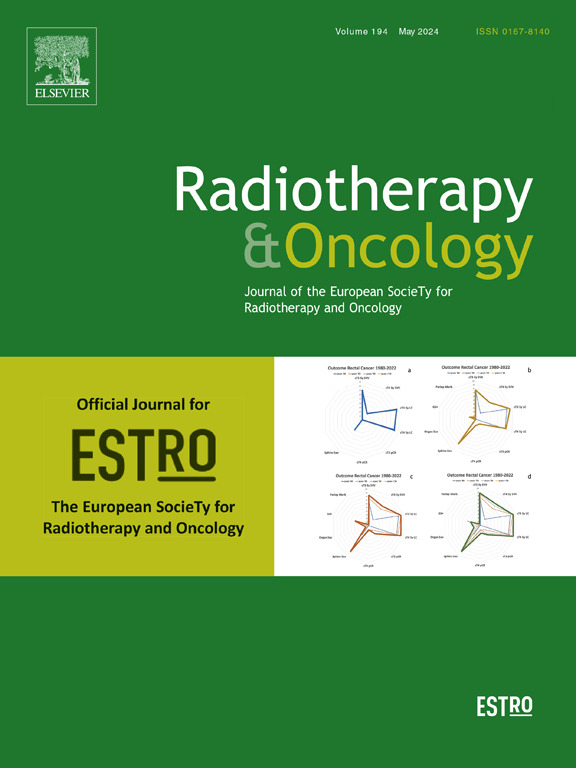The radiosensitizing effect of Caffeic Acid Phenethyl Ester in breast cancer is dependent on p53 status
IF 4.9
1区 医学
Q1 ONCOLOGY
引用次数: 0
Abstract
Background and purpose
Radiotherapy is one of the standard treatments for breast cancer, but causes adverse effects in normal tissues, narrowing the therapeutic window. Caffeic Acid Phenethyl Ester (CAPE) has been proposed to have cytotoxic and radiosensitizing effects in cancer cells, whilst protective properties in normal tissues. We have investigated the anti-tumour effects of CAPE in breast cancer in vitro and in vivo and provided evidence regarding its radioprotective effect.
Materials and methods
Cytotoxic and radiosensitizing effects were determined in vitro in luminal A, HER2+ and triple negative breast cancer and in normal breast cell lines by cell viability and clonogenic survival assays, respectively. Effects on cell metabolism, mitochondrial function and inflammation were investigated. CAPE anti-tumour effects were also investigated in vivo in a MDA-MB-231 tumour-bearing mouse model.
Results
Cell viability decreased upon CAPE treatment in a dose dependent manner (IC50 53.5 ± 33.7 µM). CAPE shifted cellular metabolism towards glycolysis (p < 0.05) and induced mitochondrial membrane depolarization (p < 0.01). CAPE sensitized only p53 mutated or deficient cell lines to radiotherapy (p < 0.05), but not p53 proficient lines. In normal breast cells, CAPE increased the surviving fraction upon radiation (p = 0.03). NF-κB activity was decreased in p53 mutant cancer cells (p < 0.01), but increased in p53 proficient lines (p < 0.01) upon CAPE treatment. Combination of radiotherapy and CAPE resulted in increased survival (22 days) compared to control (p < 0.05).
Conclusion
Our findings highlight that CAPE could widen the therapeutic window in breast cancer with non-functional p53, by radiosensitizing the tumour cells while protecting the normal tissue.
咖啡酸苯乙酯对乳腺癌的放射增敏作用依赖于p53状态
背景与目的放疗是乳腺癌的标准治疗方法之一,但对正常组织有不良影响,使治疗窗口缩小。咖啡酸苯乙酯(CAPE)被认为对癌细胞具有细胞毒性和放射增敏作用,同时对正常组织具有保护作用。我们在体外和体内研究了CAPE对乳腺癌的抗肿瘤作用,并提供了其放射防护作用的证据。材料和方法分别通过细胞活力和克隆生存试验,在体外对luminal A、HER2+和三阴性乳腺癌细胞株和正常乳腺细胞株进行细胞毒性和放射增敏试验。研究对细胞代谢、线粒体功能和炎症的影响。在MDA-MB-231荷瘤小鼠模型中也研究了CAPE的抗肿瘤作用。结果CAPE处理后细胞活力呈剂量依赖性下降(IC50为53.5±33.7µM)。CAPE使细胞代谢转向糖酵解(p <;0.05)和诱导线粒体膜去极化(p <;0.01)。CAPE仅使p53突变或缺陷细胞系对放疗敏感(p <;0.05),但p53熟练系没有。在正常乳腺细胞中,CAPE增加了放疗后的存活率(p = 0.03)。p53突变癌细胞中NF-κB活性降低(p <;0.01),但p53熟练系增加(p <;0.01)。与对照组相比,放疗和CAPE联合治疗可增加生存期(22天)(p <;0.05)。结论CAPE可以在保护正常组织的同时使肿瘤细胞放射增敏,从而扩大无功能p53乳腺癌的治疗窗口。
本文章由计算机程序翻译,如有差异,请以英文原文为准。
求助全文
约1分钟内获得全文
求助全文
来源期刊

Radiotherapy and Oncology
医学-核医学
CiteScore
10.30
自引率
10.50%
发文量
2445
审稿时长
45 days
期刊介绍:
Radiotherapy and Oncology publishes papers describing original research as well as review articles. It covers areas of interest relating to radiation oncology. This includes: clinical radiotherapy, combined modality treatment, translational studies, epidemiological outcomes, imaging, dosimetry, and radiation therapy planning, experimental work in radiobiology, chemobiology, hyperthermia and tumour biology, as well as data science in radiation oncology and physics aspects relevant to oncology.Papers on more general aspects of interest to the radiation oncologist including chemotherapy, surgery and immunology are also published.
 求助内容:
求助内容: 应助结果提醒方式:
应助结果提醒方式:


